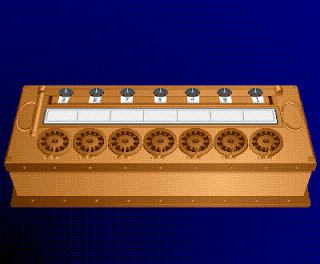One newspaper tried to relate how the fast changes in computer technology would look to a similar pace in the auto industry:
"Had the automobile developed at a pace (equal) to that of the computer during the past twenty years, today a Rolls Royce would cost less than $3.00, get 3 million miles to the gallon, deliver enough power to drive (the ship) the Queen Elizabeth II, and six of them would fit on the head of a pin!"These changes have occurred so rapidly that many people do not know how our modern computer got its start.
The First Computing Machines "Computers"
Since ancient times, people have had ways to deal with data and numbers. Early people tied knots in rope and carved marks on clay tablets to keep track of livestock and trade. Some people considered the 5000 year old ABACUS a frame with beads strung on wires to be the first true computing aid.
As trade and tax system grew in complexity, people saw that faster, more reliable and exact tools were needed for doing math and keeping records.
In the mid-1600's, Blaise Pascal and his father, who was a tax officer himself, were working on taxes for the French government in Paris. The two spent hours figuring and refiguring taxes that each citizen owed. Young Blaise decided in 1642 to build an adding and subtraction machine that could aide in such a tedious and time consuming process. The machine Blaise made had a set of eight gears that worked together much like an odometer keeps track of a car's mileage. His machine encountered many of problems. For one, it was alwaysbreaking down. Second, the machine was slow and extremely costly. And third, people were afraid to use the machine thinking it might replace their jobs. Pascal later became famous for math and philosophy, but he is still remember for his role in computer technology. In his honor, there is a computer language named Pascal.



No comments:
Post a Comment